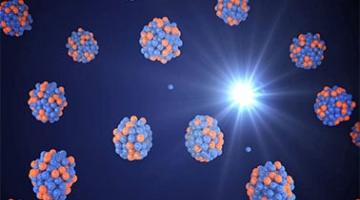- Sur www.edx.org
Nuclear Reactor Physics Basics
Vous ne pouvez pas accéder à un cours au statut archivé.
- À son rythme
- Accès libre
- Certificat payant
- 6 séquences
- Niveau Intermédiaire
Détails du cours
Déroulé
Section 1. Properties of Free Neutron and Nuclear Fission
- Describe the properties of free neutrons and it's classification
- Indentify principal nuclear reaction - neutron sources
- Define main properties of nuclear fission
Section 2. Interactions of Neutrons with Matter
- Define main process of neutron interaction with nuclei of medium
- Define microscopic and macroscopic cross sections and mean free path
Section 3. Neutron Field and Main Functions to Describe it
- Define neutron flux, net current, one-way currents and vector of net current
- Calculate the functions in simple cases
Section 4. Diffusion Theory. Diffusion equation and Fick 's Law
- Define main approximations of diffusion theory - Fick's Law and diffusion equation
- Explain each term in diffusion equation
Section 5. Solutions of Diffusion Equation in Different Geometries
- Define initial and boundary conditions to find solution
- Find solutions of diffusion equation in different geometries
- Interpret the solutions from physical meaning
Section 6. Solutions of Diffusion Equation in Multiplying Medium
- Find and interpret the solution in multiplying medium
- Define material and geometry buckling, multiplication factor
Section 7. Main Principals of Slowing down of Neutrons
- Define the reason to slow down of neutrons
- Explain what nuclear reaction is the best for slowing down
- Explain main principals of elastic scattering - post collision energy range, frequency function, mean energy loss per one collision etc.
Section 8. Neutron Spectrum in Non-Absorbing Medium
- Define lethargy of neutrons and it's connection to energy
- Explain the terms in slowing down equation
- Find the solution in non-absorbing medium
Section 9. Neutron Spectrum in Absorbing Medium
- Explain the dependency of absorbing cross section to energy
- Define Doppler effect, slowing down density, resonance escape probability
- Find solution of slowing down equation in absorbing medium
Section 10. Thermalization of Neutrons
- Define main principles of neutron behavior in thermal range
- Explain ideas to find thermal neutron flux - Maxwell's spectrum
- Define averaged cross section, Vescott factors and it's dependency on ambient temperature
Section 11. Multi Group Method
- Define energy group
- Define principles of getting averaged cross section
- Explain the multi group approximation
- Find solutions of group diffusion equations
Prérequis
Acquisition in math and general physics, basics of integration, first and second order differential equations, vector algebra, math analysis, basics of atomic physics.
Intervenants
Yury N. Volkov
Senior lecturer, PhD in Nuclear Engineering
National Research Nuclear University “MEPhI”
Éditeur
National Research Nuclear University “MEPhI” is one of the most recognized technical universities in Russia. It is the only research nuclear university in Russia. The aim of the university existence is preparing the specialists for nuclear industry, science, information technology and other high-tech sectors of Russian economy. National Research Nuclear University “MEPhI” implements postgraduate professional education curricula (PhD and postdoctoral level), carries out fundamental and applied scientific research in high-priority fields of science and technologies. Among MEPhI graduates are Nobel Prize winners, members of the Russian Academy of Sciences, and winners of national prizes. Its professors and alumni have made major contributions to various fields of theoretical and experimental physics, mathematics, cybernetics, and computer sciences.

Plateforme
EdX est une plateforme d'apprentissage en ligne (dite FLOT ou MOOC). Elle héberge et met gratuitement à disposition des cours en ligne de niveau universitaire à travers le monde entier. Elle mène également des recherches sur l'apprentissage en ligne et la façon dont les utilisateurs utilisent celle-ci. Elle est à but non lucratif et la plateforme utilise un logiciel open source.
EdX a été fondée par le Massachusetts Institute of Technology et par l'université Harvard en mai 2012. En 2014, environ 50 écoles, associations et organisations internationales offrent ou projettent d'offrir des cours sur EdX. En juillet 2014, elle avait plus de 2,5 millions d'utilisateurs suivant plus de 200 cours en ligne.
Les deux universités américaines qui financent la plateforme ont investi 60 millions USD dans son développement. La plateforme France Université Numérique utilise la technologie openedX, supportée par Google.

